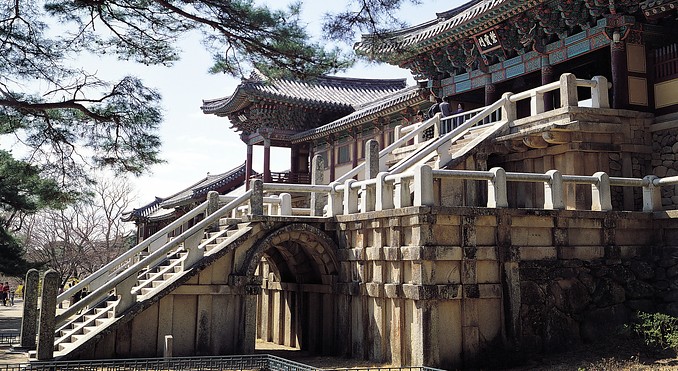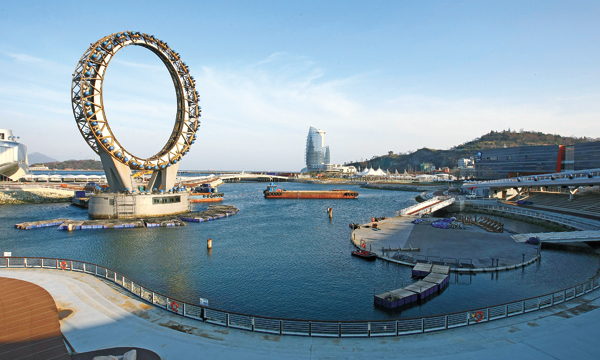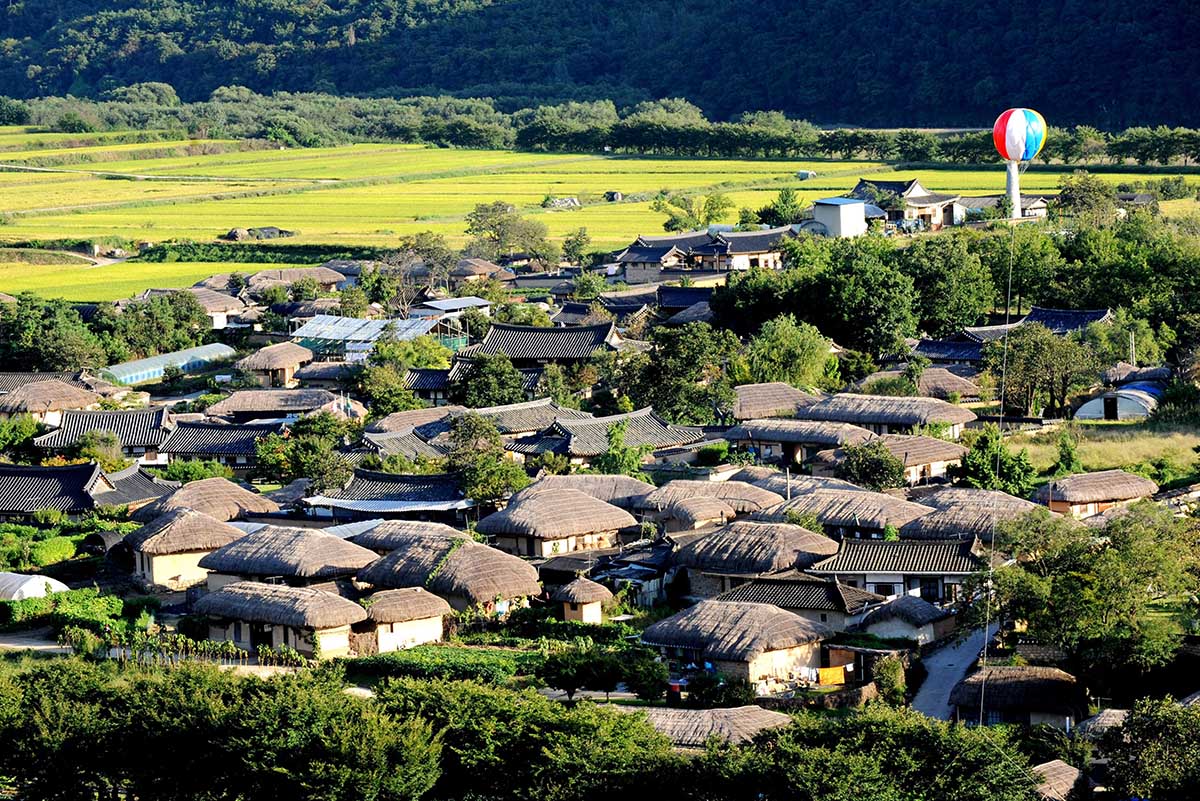| Day-1 (Saturday):Seoul - Gongju - Daejeon [Lunch/Dinner] |
|
Arrival in Seoul
- Welcome to our All-Inclusive Korea Packages starting from Seoul. Today you will depart for
Gongju for Magoksa Temple (130km/2hours distance). Upon arrival you will experience meditation & conversation over tea with a monk at Magoksa Temple, a representative temple surrounded by a mountain and rivers in Chungnam Province.
The temple has many treasures and cultural properties. Interesting fact about the temple is
that it was never damaged by any major wars, including the Imjin War and the Korean War.
After a lunch break, continue to visit Gongsanseong Fortress. It is a mountain castle which was established during the Baekje Period (234-678).
It is worth the visit for its historical and cultural significance, and also for the beautiful view of the Geumgang riverside and the walking trail.We continue with visits to Tomb of Muryeong King. Only seven graves have been discovered so far. Even though many artifacts were stolen from the tombs, the tombs serve as an important evidence of Baekje culture and the
foreign exchanges during that period. Next visit Gongju National Museum which preserves and displays cultural treasures. The most important of these artifacts are displayed
permanently, while the remaining items rotate with special exhibitions. After the Gongju tour, move to Daejeon (30km/40mins driving) for dinner and overnight.This tour will end approximately at 19:30.
- Lunch:Korean table d'hote
- Dinner:Marinated ribs
- Hotel Check-in
OVERNIGHT: Daejeon Ramada Hotel [4*]
|
| Day-2 (Sun): Daejeon - Jeonju - Jinan - Gwangju [Breakfast/Lunch/Dinner] |
-
Breakfast in the hotel
- Our destination today is Jeonju Hanok Village (80km/1hour 30mins distance) with over 800 traditional Korea houses. The village is famous among tourists because of its atmosphere that strongly contrast with the modern city around it. Choose your preferred Hanbok,
Korean National Costume and make a special memory wearing Hanbok with your
companions. You will explore Gyeonggijeon Shrine which was erected in 1410 and holds the
portrait of King Tae-jo, the founder of the Joseon Dynasty. Afterward you will have Jeonju
Bibimbab lunch and taste Makkolli (Korean traditional Wine) at a local restaurant.
Following a lunch, continue to visit Tapsa Temple (40km/1hour distance) which is famous for the over 80 stone pagodas built by Lee Gapyong, a retired scholar. Those stone pagodas
have different sizes and shapes from cone-shaped to straight-shaped. How this tall tower
was built is still unclear, drawing much attention from people. It is said that those stone
pagodas were made in the late 1800's entirely by Lee Gapyong alone. Even though the
pagodas have been around for more than 100 years, they have never collapsed nor even
moved through strong winds, making them truly amazing. Our next visit will be Gwangju (110km/1hour 30mins distance) to have dinner and check into hotel. This tour will end approximately at 19:30.
- Lunch:Tteokgalbi & Bibimbap
- Dinner:Shabu-shabu
- Hotel Check-in
OVERNIGHT: Holiday Inn Gwangju [5*]
|
| Day-3 (Mon): Gwangju - Boseong - Suncheon - Yeosu [Breakfast/Lunch/Dinner] |
-
Breakfast in the hotel
- Kick off the morning by visiting Daehan Dawon Tea Plantation (70km/1hour distance) produces high-quality green tea and is a popular tourist attraction year-round thanks to the vast rows of tea trees that line the hillside like a deep green carpet. Despite being located
on a small peak at just 350 meters above sea level, the observation deck at the summit
offers views of the sea on clear days. You will have a chance to taste Boseong Green Tea!
Our next visit will be to Naganeupseong Walled Town (40km/40mins distance) consists of three neighborhoods along the east, south and west of the fortress walls. The village is overall well preserved, allowing visitors to observe houses and lifestyles that have all been
passed down from the past. The town is highly valued as a historical and cultural resource
for studying traditional folk customs. After a lunch break, we continue with visits to the reed fields in Suncheonman Bay which are thickly covered with reeds taller than a full-grown man. It is the biggest colony of reeds in Korea. The scene of the entire field swaying in the wind is like watching waves on the sea. Suncheonman Bay Wetland Reserve is a natural habitat for birds of over 140 species. After Suncheon tour, we depart to Yeosu for dinner. Overnight in Yeosu.
This tour will end approximately at 19:30.
- Lunch:Chicken course meal
- Dinner:Steamed seafood dish & Smoked Duck
- Hotel Check-in
OVERNIGHT: Yeosu Ramada Plaza Hotel[4*]
|
| Day-4 (Tue): Yeosu - Jinju - Busan [Breakfast/Lunch/Dinner] |
-
Breakfast in the hotel
- Wake up in Yeosu and get ready for a Marine Cable Car offering the safe yet thrilling experience with the gondola to operate over seawater. Enjoy the scenery of downtown
Yeosu and the archipelago around the old seaport. Yeosu Maritime Cable Car is the first of
its kind in Korea, connecting Dolsan Island and the mainland over the ocean.
Arrival to Jinju (100km/1hour 30mins distance) around 12:00pm and we have lunch break.
You will be visiting Jinjuseong Fortress, which is historically linked to the Imjin War (1592-1598). It was originally named Geoyeolseong Fortress during the Three Kingdom Period, later renamed as Chokseokseong Fortress in the Goryeo dynasty and finally settled as
Jinjuseong Fortress in the Joseon dynasty. Outside the castle, Cheongcheon River flows in the west, Namgang River in the south and a pond lies between the castle and the trench dug during the war times. After the Jinju tour, transfer to Busan for dinner and the rest of day is yours to explore the vibrant city. This tour will end approximately at 19:30 pm. Overnight in Busan.
- Lunch:Fried shiitake sweet and sour & Bibimbap
- Dinner:Korean style Pork belly
- Hotel Check-in
OVERNIGHT: Busan Grand Josun hotel [5*]
|
|
Day-5 (Wed): Busan - Gyeongju [Breakfast/Lunch/Dinner]
|
OVERNIGHT: Gyeongju Lahan Select Hotel[5*]
|
|
Day-6 (Thu): Gyeongju - Andong - Wonju - Pyeongchang [Breakfast/Lunch/Dinner]
|
-
Breakfast in the hotel
- After breakfast in the morning, drive to Andong (160km/2hours distance) and roughly we
will reach Andong Hahoe Village by 11:00am.
Andong Hahoe Village is one of the most famous folk villages in Korea. Surrounded by the
Nakdonggang River, the village is home to descendants of the Ryu clan of Pungsan, which
still makes up 70 percent of the villagers. The village became even more famous after
Queen Elizabeth of England visited on April 21, 1999 and President George H. Bush of
U.S.A. in 2005. After a lunch break, we continue with visits to Wonju Hanji Theme Park (130km/1hour
30mins distance) where you can get a chance to experience the Hanji making process.
At Wonju Hanji Theme Park, you can learn everything about hanji (traditional Korean paper), including its origin and history, through exhibitions, education and activity
programs. After the tour transfer to Pyeongchang (100km/1hour distance) for dinner and check in
hotel in Pyeongchang. This tour will end approximately at 20:30 pm
- Lunch:Grilled Salted Mackerel & Jjimdak
- Dinner:Korean Pork belly & Grilled Dried Pollac
- Hotel Check-in
OVERNIGHT: Intercontinental Pyeongchang[5*]
|
| Day-7 (Fri): Pyeongchang - Mt.Seorak - Seoul [Breakfast/Lunch]
|
-
Breakfast in the hotel
- Wake up in Pyeongchang and get ready for visiting Ski Jump Tower Observatory by monorail for Olympic Winter Games Pyeongchang 2018. Enjoy the view of the Sky Lounge nd have some free time enjoying coffee or tea on your own expense.Finally, travel to Yangyang (90km/1hour distance) for a short hiking at Jujeongol of Mt. Seorak to enjoy the nature. Don’t miss the breathtaking view from Mt. Seorak! It is the most famous place for fall colors in Seoraksan Mountain, and its handsome valley and rock formations are well-known as well. Keep your eyes open for strange rock formations. After the hiking, have some lunch at local restaurants around 12:30.Return to Seoul around 18:00.
- Lunch:Western food
- Return to Seoul at around 18:00
- End of service
|


















